|
|
|
Sort Order |
|
|
|
Items / Page
|
|
|
|
|
|
|
| Srl | Item |
| 1 |
ID:
168261
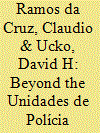

|
|
|
|
|
| Summary/Abstract |
Ten years ago, in 2008, the Brazilian Government adopted a strategy to regain control over the favelas in Rio de Janeiro – the Pacifying Police Units (UPP). In spite of initial favorable results, the main threat, namely the Red Command (CV), fought back and by 2014 the UPP strategy was badly frayed. In order to defeat this threat, it is necessary to reconceptualize CV as a criminal insurgency and to pinpoint and address the social and political factors that sustain it. This allows for a response inspired by the ‘shape-clear-hold-build’ counterinsurgency approach, which while cost-intensive is, in the long term, the most sustainable path to achieving security within the favelas and integrating these neglected areas within the broader city of Rio de Janeiro.
|
|
|
|
|
|
|
|
|
|
|
|
|
|
|
|
| 2 |
ID:
177674
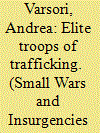

|
|
|
|
|
| Summary/Abstract |
In recent years, scholars and practitioners alike have acknowledged the threat posed by Military-Trained Gang Members (MTGMs). These individuals have the training, know-how, and expertise necessary to significantly increase the effectiveness and lethality of the armed group they belong to. Even though this threat is present in several criminal insurgencies, usage of the MTGM concept is limited to studies regarding the United States. This paper broadens this scope by assessing the presence and characters of the MTGM phenomenon in the city of Rio de Janeiro, Brazil. Through a review of media output on the topic, spanning over more than 21 years, the paper exposes the roots and extent of this trend, as well as the roles played by MTGMs.
|
|
|
|
|
|
|
|
|
|
|
|
|
|
|
|
| 3 |
ID:
192929
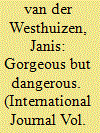

|
|
|
|
|
| Summary/Abstract |
How do deeply unequal cities in the Global South project soft power, and what are the tensions and contradictions that emerge when they do? Cities’ strategies to enhance their international appeal can be gauged through three interlocking or complementary approaches: first, leveraging the strategic value of events and associated services; second, developing iconic architecture and mega-projects; and third, making themselves attractive to the so-called “creative class.” Drawing on a brief comparative analysis of Rio de Janeiro and Cape Town, these strategies are assessed in relation to the dynamics of soft power and soft disempowerment. Although Rio de Janeiro and Cape Town share formidable resources to generate soft power, their societal complexities of crime and violence cast a heavy disempowering shadow on their innovative soft power strategies.
|
|
|
|
|
|
|
|
|
|
|
|
|
|
|
|
| 4 |
ID:
172542
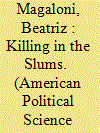

|
|
|
|
|
| Summary/Abstract |
State interventions against organized criminal groups (OCGs) sometimes work to improve security, but often exacerbate violence. To understand why, this article offers a theory about criminal governance in five types of criminal regimes—Insurgent, Bandit, Symbiotic, Predatory, and Split. These differ according to whether criminal groups confront or collude with state actors, abuse or cooperate with the community, and hold a monopoly or contest territory with rival OCGs. Police interventions in these criminal regimes pose different challenges and are associated with markedly different local security outcomes. We provide evidence of this theory by using a multimethod research design combining quasi-experimental statistical analyses, automated text analysis, extensive qualitative research, and a large-N survey in the context of Rio de Janeiro’s “Pacifying Police Units” (UPPs), which sought to reclaim control of the favelas from criminal organizations.
|
|
|
|
|
|
|
|
|
|
|
|
|
|
|
|
| 5 |
ID:
107858
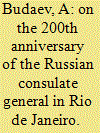

|
|
|
| 6 |
ID:
095102
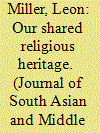

|
|
|
| 7 |
ID:
110513
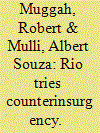

|
|
|
|
|
| Publication |
2012.
|
| Summary/Abstract |
"There are uncanny similarities between Rio de Janeiro's pacification strategy and ongoing counterinsurgency operations in Afghanistan and elsewhere."
|
|
|
|
|
|
|
|
|
|
|
|
|
|
|
|
| 8 |
ID:
189468
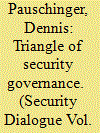

|
|
|
|
|
| Summary/Abstract |
This article reconsiders contemporary urban security governance. Conceptually, it revisits Foucault’s governmentality lectures to comprehend how security governance is carried out in places where the use of digital security technologies co-exists with overly lethal and repressive forms of policing. The author advances his analysis by conceptualizing a triangle of security governance in which disciplinary powers of control, apparatuses of security and sovereign/necropower are at work simultaneously, complemented by a fourth dimension that takes into account what Foucault outlined in the lectures as the ‘government of things’, which is the sociotechnical relationship between the agency of humans and machines. Empirically, the article explores the technopolitical turn in urban security policies in the city of Rio de Janeiro in the wake of the 2014 World Cup and the 2016 Olympics. Using discourses that are embedded in globalized mega-event security standards and legacy claims, authorities in Rio promoted a narrative of new material and non-material security measures that were intended both to secure the World Cup and the Olympics and to help overcome permanently entrenched urban conflicts in the city. By critically analysing these two approaches of new material and non-material security measures, the author shows how new security technologies are perfectly integrated into a continuum of death politics in Rio de Janeiro in ways that are conceptually best appreciated by considering how the triangle of security governance works in the digital era.
|
|
|
|
|
|
|
|
|
|
|
|
|
|
|
|
|
|
|
|
|